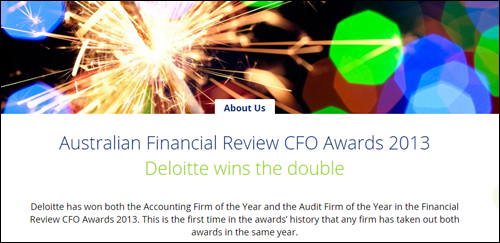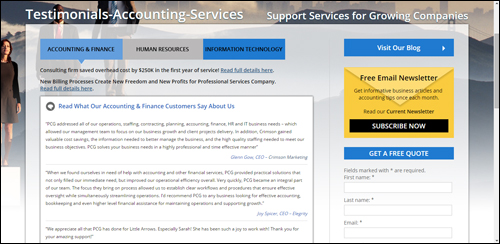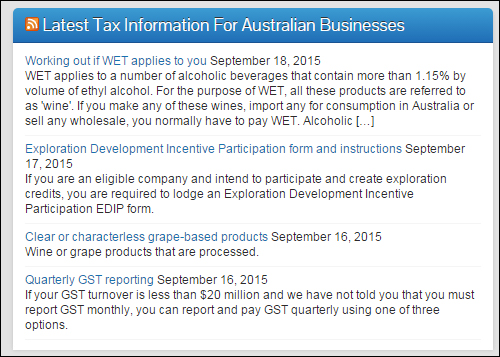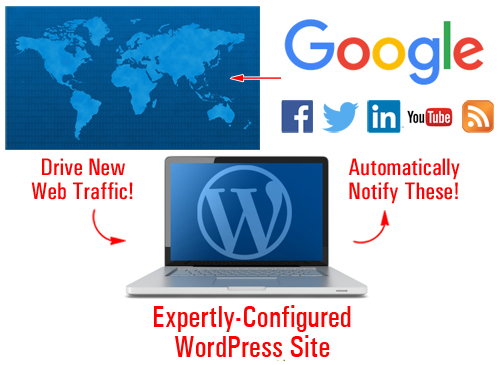Grow Your Accounting Business Online With WordPress
 The digital age has not only revolutionized business worldwide, it has also created many challenges and great opportunities for accounting and financial services businesses.
The digital age has not only revolutionized business worldwide, it has also created many challenges and great opportunities for accounting and financial services businesses.
Challenges Certified Public Accountants Face Online
CPAs today must work harder than ever before to remain in business. Not only do you have to become actively involved in the communities and industries your business serves, you must also develop and maintain a strong web presence. This includes having an effective website and searching for better ways to market your business services online.
As well as investing dollars in offline marketing activities such as advertising on newspapers, ads in industry publications and magazines, radio and tv spots, etc., businesses in the accounting industry are now finding that increasingly larger amounts of their marketing budget need to be delegated to develop and maintain a website that brings new leads, engages visitors, outperforms the competition in search engines and social media, and helps create wider marketing reach online.
This means that your website not only has to look professional, your pages have to be fast-loading, and your site has to be easy to navigate, but it’s also important to keep in mind that the needs of the website will change over time and many areas will need to be updated frequently. This requires having a sound website and content management strategy.
One other problem that accountancy firms (and all other businesses) face online, is that your site has only around 30 seconds or less to give users what they need or they will look elsewhere.
“Websites have evolved into central information hubs where service information is still present but enhanced with web portals, hyperlinks to state and federal sites, and a variety of free tools.”
Michael Alter, http://www.accountingweb.com/technology/accounting-software/tips-for-improving-your-website
Opportunities For Accountants In The Web Economy
As well as facing significant business and technology changes, there are also many online opportunities available for businesses in the accounting profession that are willing to evolve to meet digital challenges and who can think outside the box when it comes to improving their online marketing skills.
In this comprehensive guide, you will discover a number of ways to drive more web traffic and build more online credibility for your accounting or financial services business.
![]()
As well as providing practical tips and information on cost-effective ways to improve your accounting website, we also focus on the benefits and advantages of using the WordPress content management system to power your accounting website or blog.
For more information about the benefits and advantages of using the WordPress CMS platform, go here:
- Why A Poorly Designed Web Site Can Cost You Potential Clients And What To Do About It
- A Beginner’s Guide To Growing Your Small Business Using WordPress
Tips To Improve Your Accounting Or Financial Services Website
Let’s start by covering some basic stuff. In this section, we’ll look at ways to improve your accounting website and get better results online. We will look at what web pages you need, what content you need, layout and navigation structure, etc.
If you need website planning assistance, check out the article we have written here: A Basic Guide To Website Planning For Business Owners
Ways To Improve Your Website Pages
All business websites require some essential pages. Let’s take a look at the pages your need and how to structure your accounting or financial services website for best results.
Services And Products
It’s essential to include a page that explains your services and products.
This page will include all the services and products you offer, such as:
- Business accounting – planning, incorporation of companies, general accounting, payroll, financial statement compilation, book keeping, budgeting, financing, forecasting, strategic planning, consulting, etc.
- Taxation – preparation, planning, reviewing, auditing, advising, problem resolution
- Investment strategies
- Corporate accounting
- Wealth creation
- Superannuation/retirement plan (401k) advice
- Audit risk assessment and assurance
- Quickbooks – setup, training, tune up, and support
- Specialist services – mergers, acquisitions, information technology, secretarial, rentals, trusts, fiduciary accounting, succession planning, selling a business, transfers, etc.
- Lending and leasing
Make sure to list all of the services you provide. Provide your visitors with information that will educate them about the benefits of using your services and why they should book an appointment.
About Us
This page needs to describe your business and what your business stands for, its unique approach, philanthropy, etc.
It’s important to list any CPA awards, accreditations, certifications, recognitions, publications, associations, etc., that could be used to promote your company and position it above your competitors.

(List all of your industry awards accreditations, certifications, recognitions, publications, associations, etc. in your About Us page. Image sourced from: deloitte.com)
Meet Your Staff
Are you searching for ideas to sell more products online or increase user interaction with your site? Then help your visitors get to know, like and trust your organization better.
You want people to relate to your business. One great way to do that is to have a page that introduces your staff or team members. It should include a photo and a mini biography. Since most visitors will not tend to be familiar with accounting terms your bio descriptions should tell who they are and what their specialties are. It should also explain what those specialties mean. It should even include social buttons that will allow your visitors to follow some of your team members on their social pages.
On this page, make sure to outline your staff member’s qualifications, why they are an invaluable asset to your team, and more importantly, how they will help add value to your clients’ business.

(Make sure to add a page that introduces your team members to prospective new clients. Image source: deepsky.com)
For a detailed tutorial on how to easily add an easy-to-maintain list directory of staff members in your WordPress site using free WordPress plugins, go here: How To Easily Add A Simple Employee List On Your WordPress Site With No Coding Skills Required
Career Opportunities
This is a listing of career opportunities available within your firm. This page would include training offered, employee benefits, opportunities for advancement, social activities sponsored by your organization, etc. It should include case studies of graduates who have risen within your firm and information such as the job outlook and career opportunities in the accounting and financial services industry.
Also include a positions available section in your page. If there are no positions currently available, consider inviting people to return periodically to the page, join your updates list, follow your social pages, etc.
Case Studies & Testimonials
Testimonials and case studies are a great way to show potential clients what type of solutions you are capable of implementing to help them solve problems. Adding a web page with case studies and reviews from clients also helps to provide potential clients with social proof online.

(Add a page to your site with case studies and reviews from clients. Screenshot source: pcg-services.com)
We have written extensively about using client case studies and reviews to improve your business results online. For more info, see this article: All You Need To Know To Get Better Results Online Using More Effective Client Testimonials
Contact Page
Having a contact page is absolutely necessary.
It should provide visitors with some or all of the following:
- Name
- Physical location
- Phone
- Facsimile
- Map and directions
- Web URL
- Contact form
- Request for more information – contact details
- Social media links
- Interactive chat feature
If you operate out of different areas you want to make that clear when displaying the address and contact info.
You could also include links to an FAQ section, frequently-visited pages, special offers, support page, newsletter, blog, etc.
Blog Section
A blog is a powerful marketing tool for your business. Blogs typically include a content management system that is easy to use and allows you to easily promote your business using timely content like news and events, company updates, educational articles and tutorials, discussions on current topics, promotional videos, infographics, etc.
If you already have an established accounting website, then consider adding a WordPress-driven blog to promote your business.
If you don’t have a website yet, or your existing site is very hard to add new content to or not giving you the results you want, then WordPress can act both as your website and blog.
![]()
Something few people know about, is that WordPress can turn into an automated traffic-generation machine that can attract web traffic to your web site, simply by adding regular content to your website.
(An expertly configured WordPress site can automate your traffic generation)
Go here to learn more about this: Web Site Traffic Blueprint – A Complete Guide To Generating More Web Visitors Automatically With WordPress
Legal Information Pages
It’s vitally important to have a website that complies will all legal requirements online, not just for building trust with prospective clients, but also to ensure that you are not breaching local, regional and federal laws and regulations in whichever area you do business in.
Depending on what products and services you provide, adding the legal pages below to your site will help keep you out of trouble with most regulatory authorities, third-party service providers (e.g. Google), and other potential legal threats and inconveniences:
- Contact Page
- Privacy Statement
- Terms And Conditions Of Use
- Website Disclaimer
- Affiliate Agreement
- Anti-Spam Policy
- Compensation Disclosure
- DMCA Notice
- Earnings Disclaimer
- External Linking Policy
- Health/Financial Disclaimers
- Refund Policy
- Video/Audio Terms
- etc.
If you want to learn more about adding legal pages to your website, refer to this article: The Importance Of Adding Legal Pages To Your Website
How To Improve The Content On Your Site
In today’s highly competitive online economy, being generous with content has become one of the key differentiators for businesses selling similar products or services.
Providing great content with information and tips will get your readers to share your web pages and come back for more information. Content marketing is a great way to inform and teach site visitors and prospects about your business.
For example, topics for an accounting or financial services business could cover:
- Explanations of balance sheets
- Profit & loss statements
- Duties and legal responsibilities of company directors
- How to present accounts for non-profit activities
- Cashflow planning
- Maximizing business insurance cover
- Risk prevention
- Tips on structuring your self-managed retirement fund
- Things to look for when … (e.g. purchasing insurance, setting up payroll systems, etc.)
You can also create a series of educational articles that will help your your prospective clients understand your accounting or financial services, such as forensic accounting, tax accounting, tax planning for small business, reducing debt, understanding financial conventions, etc.
Remember to use relevant keywords and terms in your articles that readers will be searching for.
![]()
We recommend subscribing to our Content Marketing Email Training Series. You will receive regular training emails with easy-to-digest information that will show you how to drive more traffic to your website or blog, save money creating high-quality content that will add value to your site visitors and grow your business online using content marketing. It’s not only a great course with loads of useful information, it’s also completely FREE!
Improving User Experience
Improving website user experience (often referred to as UX) will help you keep visitors coming back and engaging with your site. This section will show you ways you can improve visitor engagement and user experience.
Content Syndication – RSS Feeds
RSS feeds provide plenty of benefits for your site.
If you provide valuable information, other sites may want to syndicate your content to their visitors.
Some of the benefits of having other businesses syndicate your content, include:
- All of your content updates are in one place
- your content distribution doesn’t rely on email
- Your feed can be shared and picked up by other sites online
- Users can subscribe to your RSS feed
- It provides links to your site
- Feeds can be submitted to RSS directories and aggregators
- RSS provides multiple ways for readers to receive your content (e.g. read your content on their mobile device using a feed reader)
- RSS is built into WordPress
There are also a number of benefits to adding syndicated content to your site from other sites, such as the fact that you don’t have to write, manage or update the content.
You can find RSS feeds with useful content for your website by searching online for relevant government departments and key industry bodies.
For example, here are some exaples of useful RSS feeds you may want to add to your accounting website:
- Taxation Policy Center: http://www.taxpolicycenter.org/press/rss.cfm
- Australian Taxation Office: https://www.ato.gov.au/RSS-news-feeds.aspx
- Canada Revenue Agency: http://www.cra-arc.gc.ca/rssfeeds/
- UK HM Revenue and Customs: http://www.hmrc.gov.uk/rss/rss.htm
- South Africa Revenue Service: http://www.sars.gov.za/Pages/RSS-Feeds.aspx

(Use RSS (Really Simple Syndication) feeds to improve your accounting site’s UX.)
Add Online Forms
Checklists and forms are a fantastic way to increase visitor engagement and add value to your visitors. Checklists and forms can provide users with useful step-by-step instructions and resources to perform necessary tasks. They can also be great planning tools.
Forms and checklists could include subjects such as:
- How To Set Up A Business
- Negative Gearing Checklist
- Non-Profit Activity Checklist
- Disclosure Requirements
- Sole Trader Tax Checklist
- Capital Gains Tax Checklist
- Income Tax Variation Forms
Provide Other Tools
Providing unique tools, gadgets and applications for businesses is a great way to increase visitor engagement and significantly add value to potential clients. Calculators, such as loan and tax calculators, are some of the most popular tools for accounting websites. Other applications can include time cards, or retirement and interest calculators.
In the next section of this detailed article, we take a look at a several online tools you can add to your site using WordPress plugins that improve your search engine optimization, improve user engagement and drive more visitors to your business.

***
This is the end of section one.
To keep reading, click this link:
![]()
Subscribe To This Site And Get Notified Of New Tutorials!
***
***
"Wow! I never knew there's so much to learn about WordPress! I bought one of the WordPress for Dummies three years ago, such authors need to be on this course!" - Rich Law, Create A Blog Now
***


